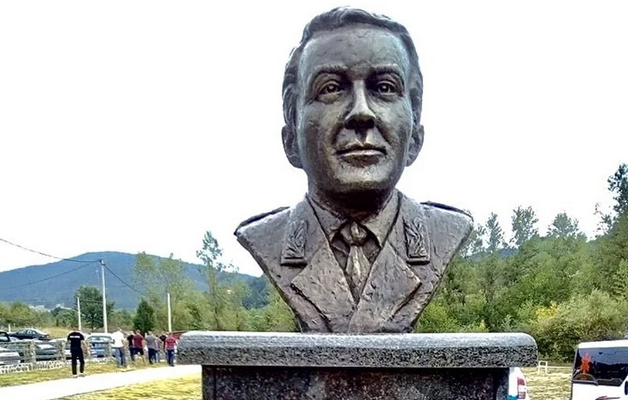Published on Klix.ba on August 25, 2020
In the wider area of Višegrad, in the last two decades, several monuments have been erected in honor of war criminals, and today they are mainly used for gatherings of members of the Ravna Gora movement and other manifestations that do not symbolize anything good.
In Gornji Vardište near Višegrad in the "Krstića dvori" complex, Vojkan Krstić, the head of the Rescue Center of Serbia, raised a bust of the war general of the Army of the RS and Serbia, Dragisa Masal, a year ago. Both of them are from Vardište, and Krstić has always stated in public that he wants to erect a monument to one of the most famous residents of Višegrad who "stood out in the defensive-patriotic war".
Not a word about the mass murders, expulsions and crimes of the non-Serb population, under the command of "Serbian heroes" like Dragisa Masal, although the facts say otherwise.
Who was Dragisa Masal?
Dragiša Masal, professional officer of the former JNA and lieutenant general of the Army of Republika Srpska, was born in 1951 in Vardište near Višegrad. He joined the RS army on May 19, 1992, the day when the formally aggressor Užice Corps of the former JNA, at the request of the UN, left Visegrad after the crimes committed and the persecution of the non-Serb population from the Drina valley.
"It was formal because the Užice Corps left behind well-armed Serbian military formations (Arkanovci, White Eagles, Šešeljevci, Chetniks) which were joined by a large number of former JNA soldiers, reservists of the Užice Corps, who replaced the JNA uniforms with Chetnik ones. and Dragiša Masal, then a high-ranking officer of the former JNA who served as the commander of TG 'Višegrad' from January 31, 1993. He had good connections in the former JNA, so he could easily obtain ammunition and rockets from Serbia that they used in Visegrad and to the Goraždan battlefield for the persecution and killing of civilians. For example, in a document dated April 8, 1993, addressed to the so-called Main Staff of the Army of the Republic of Srpska, it requests permission to take over the ammunition (rockets and bullets) that they secured in the Kragujevac military base," he said. for Klix.ba Ermin Kuka, research associate of the Institute for Research on Crimes against Humanity and International Law, University of Sarajevo.
Kuka reminds that Dragiša Masal, in the order for further aggressive actions in operation "Zvijezda 94", from April 11, 1994, complied with the order of the war criminal Ratko Mladić, which, among other things, stated "Push energetically forward, do not look back at what happened is happening around us. The Turks must disappear from these areas".
"Masal devotedly participated in the most cruel ethnic cleansing and persecution of the non-Serb population from the Drina valley. Mass murders, systematic expulsion of the local population and planned destruction of their cultural and historical monuments and religious buildings marked his war path, and his 'heroism' is a celebration of crime, persecution and ethnic cleansing and destruction of mosques," Kuka points out.
Rewards for mass murder and ethnic cleansing
He adds that Masal was the main promoter and participant of ethnic cleansing, for which he was duly rewarded with financial support from Serbia.
"Military post number 7111 Han Pijesak issued to Colonel Dragisa Masal a certificate of participation in the execution of tasks in the combat zone, in order to resolve the seniority of insurance, i.e. to secure the financial income he received from Serbia", explains Kuka.
Dragiša Masal is remembered as the person who commanded, managed and ordered the actions of TG "Višegrad" which resulted in numerous individual and mass casualties of civilians in the wider area of Višegrad and Goražde.
"This especially refers to the indiscriminate shelling of civilian targets in Goražde, a UN 'protected zone' since April 1993. The aforementioned facts were confirmed by numerous documents and testimonies during the trial of Ratko Mladić at the Hague Tribunal, in which Dragiša Masal participated in his capacity defense witness. And instead of testifying in the specific case, the prosecution presented a series of documents that accused him of crimes committed against the non-Serb population and thus put him in a situation where he had to defend himself because of his wartime past. Since he died in 2017, he was not prosecuted and convicted as a war criminal. So, the prosecution did not have the opportunity to prove the whole truth about Colonel Masal's gruesome crimes committed primarily against the civilian population," says Kuka.
The provocations come from Serbia
The monument to Masal in Vardište is indicative of the fact that most such "manifestations" in the Visegrad area are organized by associations and organizations from neighboring Serbia, Kuka believes.
"A memorial cross with the names of Russian mercenaries and volunteers who died on the battlefields around Višegrad was erected by members of the Association of Veterans 'April 12' from Kosovska Mitrovica. At the commemoration of the anniversary of the arrest of the criminal Draža Mihailović, the vast majority of members of the Ravnogorsk Chetnik movement, as well as most of the provocations, come from Serbia. And while a small number of Bosniak returnees try to live normally with their Serb neighbors, on the other side there are individuals and organizations that celebrate crimes and people with a questionable war past. The erection of monuments to such people sends a bad message to coexistence in Višegrad. In every way, from the pre-war of multi-ethnic Višegrad is trying to make an ethnically pure city and thus, in peaceful times, implement Greater Serbia's goals of ethnically pure Serbian territories in the area of Eastern Bosnia," Ermin Kuka points out.
Dragiša Masal died in March 2017. He was never responsible for the war crimes committed in the area of Višegrad, Goražde and for the kidnapping in Štrpci.
